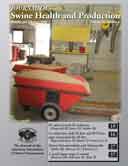Abstract:

Serological evaluation of a Clostridium perfringens type A toxoid in a commercial swine herd
J. Mark Hammer, DVM; Monte Fuhrman, DVM; Michelle Walz, BSc
PDF version is available online.
Clostridium perfringens type A (CPA) may cause suckling piglet diarrhea, which occurs within 48 hours of birth and may last approximately 5 days. Pathological findings may be unremarkable, but CPA is usually observed in or cultured in large numbers from the intestinal lumen. Preventions and treatments for CPA enteritis are variable in efficacy. A toxoid has recently become available. In this study, the serological response to the toxoid in vaccinated and nonvaccinated gilts and their progeny was evaluated in a commercial herd with a history of CPA enteritis. A toxin-antitoxin neutralization assay, quantifying neutralizing alpha antitoxin in a live-mouse model, demonstrated a difference in geometric mean alpha antitoxin titers (expressed in international antitoxin units per mL; au per mL) (? SD) between the vaccinated (239.33 ? 55.73 au per mL) and unvaccinated gilts (139.01 ? 26.35 au per mL) (P < .05). Passively acquired geometric mean titers were higher (P < .05) in piglets 2 to 4 days of age suckling vaccinated dams (231.55 ? 111.92 au per mL) than in piglets suckling control dams (112.93 ? 113.16 au per mL). These findings demonstrate that the toxoid induces a neutralizing antitoxin which is passively transferred to suckling piglets.
Keywords: Clostridium perfringens type A, neonatal diarrhea, alpha toxoid
![]() Cite as: Hammer JM, Fuhrman M, Walz M. Serological evaluation of a Clostridium perfringens type A toxoid in a commercial swine herd. J Swine Health Prod 2008;16(1):37-40.
Cite as: Hammer JM, Fuhrman M, Walz M. Serological evaluation of a Clostridium perfringens type A toxoid in a commercial swine herd. J Swine Health Prod 2008;16(1):37-40.
Search the AASV web site for pages with similar keywords.
